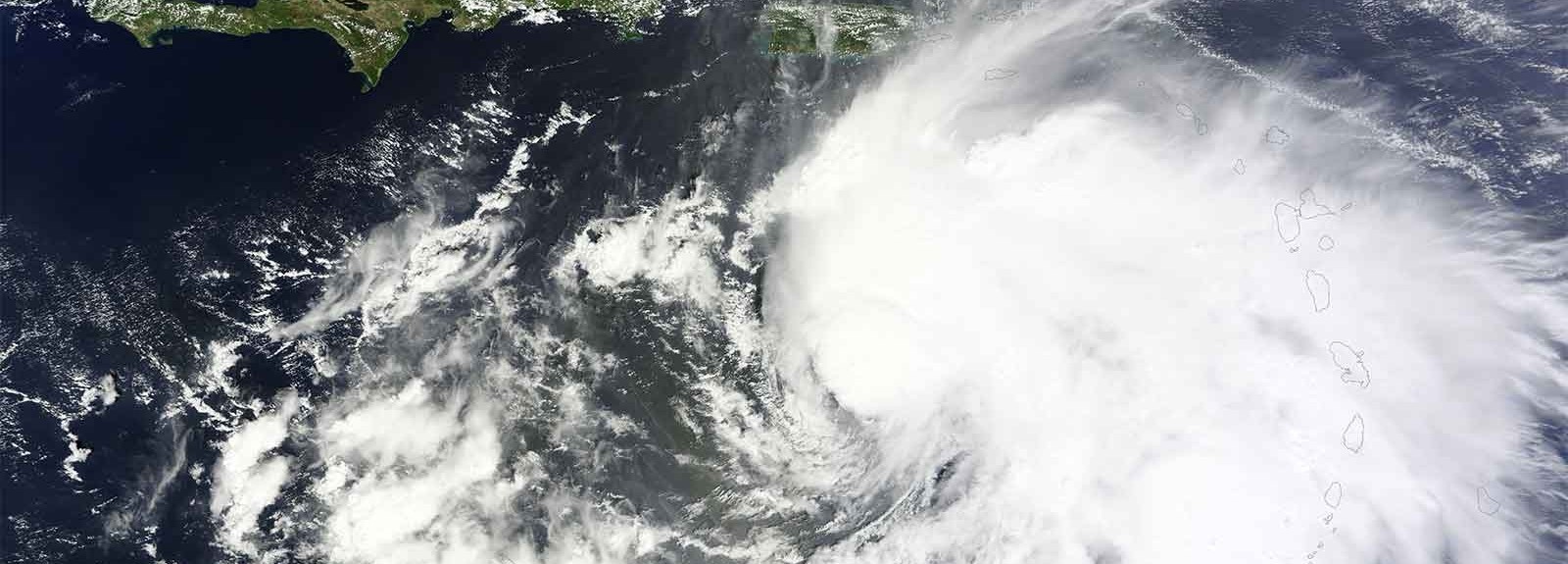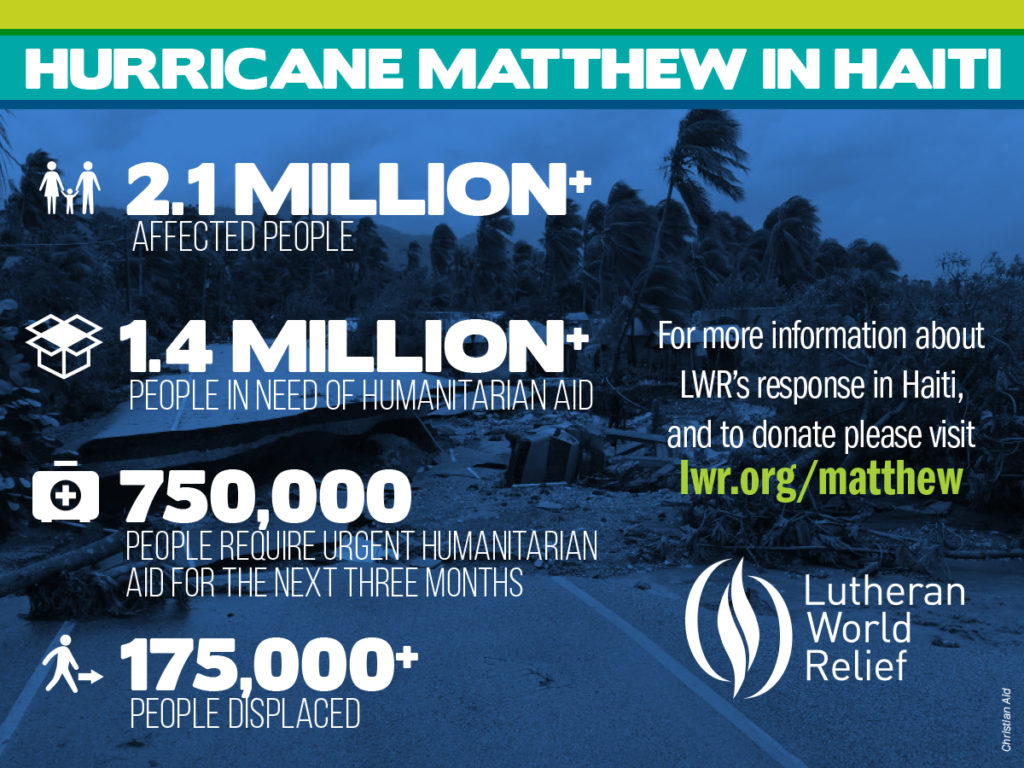You can help respond to the devastation in Haiti.
Lutheran World Relief is responding to the immediate needs of people in Haiti affected by Hurricane Matthew, mobilizing emergency relief in collaboration with the ACT Alliance, a global faith-based humanitarian coalition, and local partners. LWR is also making plans to assist farmers in the north whose crops will likely be damaged in the storm.
Please keep our brothers and sisters in your prayers.
O Lord, God of my salvation,
when, at night, I cry out in your presence,
let my prayer come before you;
incline your ear to my cry.-Psalm 88:1-2
Downloadable Resources
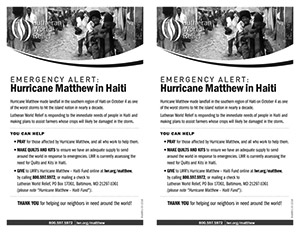 Download this bulletin insert for use in your congregation.
Download this bulletin insert for use in your congregation.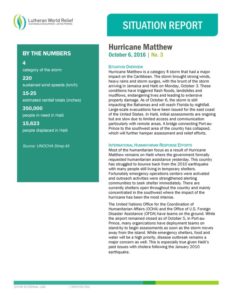 Download the latest situation report on Hurricane Matthew
Download the latest situation report on Hurricane Matthew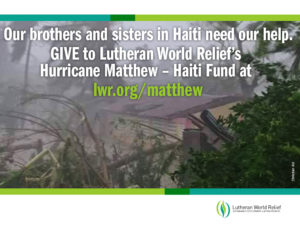 Download this image for use in a PowerPoint, or for your congregation
Download this image for use in a PowerPoint, or for your congregation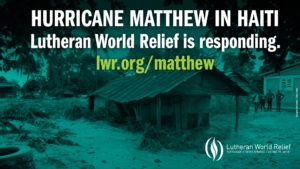 Download this image for use in your church communications
Download this image for use in your church communicationsRecent Updates
(Updated October 24, 2016)
Hurricane Matthew made landfall in Haiti on October 4 as a powerful category 4 storm. The storm brought strong winds, heavy rains and storm surges. These conditions triggered flash floods, landslides and mudflows, endangering lives and leading to extensive property damage. Haiti has struggled to bounce back from the 2010 earthquake, with many people still living in temporary shelters. In addition to the Caribbean, the storm had an impact on the east coast of the United States, particularly in parts of Florida and North Carolina.
Many organizations have deployment teams in Haiti and have begun assessments. Emergency shelter, food and water are a high priority, and disease outbreak remains a major concern. According to the latest Office for the Coordination of Humanitarian Affairs, the government estimates that more than 1.4 million people are in need of humanitarian assistance, which is 12.9 percent of the country. The number of people living in shelters jumped after the storm to 175,509 living in 307 temporary shelters. 806,000 people are at an extreme level of food insecurity and 1,25 million people (including 500,000 children) need access to safe drinking water and proper sanitation.
Lutheran World Relief has staff on the ground in Haiti and deployed additional staff from our headquarters to support the team and implement the emergency response
LWR is Responding
LWR is responding to the long-term needs of people in Haiti affected by Hurricane Matthew. Our immediate response will reach 16,643 people in some of the most affected areas. As a part of our immediate emergency response we are supporting distributions led by Lutheran World Federation (LWF) and Norwegian Church Aid (NCA) that will reach 10,000 people:
- NCA is distributing hygiene kits that include water purification tablets, soap, shampoo, toilet paper, toothpaste and laundry soap.
- The same families are also receiving LWF shelter kits, which include two tarps, two blankets and rope per the Haitian Government guidelines.
In addition, LWR is shipping 7,260 Quilts, 8,740 Personal Care Kits, 6,500 School Kits, 1,200 Baby Care Kits and 3,000 pounds of soap. These items will be distributed in the South West by LWF and in the North West by LWR’s partner ADEMA.
Our emergency assessment in the North West region showed 60 percent of crops and plantations had been destroyed, 60 percent of irrigation canals were damaged, 90 percent of fruit trees had been lost and 80 percent of fish traps had been destroyed.
In collaboration with our local partner ADEMA, LWR’s longer term response will focus on food security in the North West through the distribution of seeds, livestock and fishing equipment, and a cash-for-work program to continue the cleaning of roads and irrigation canals.
LWR's work in Haiti
LWR began working in Haiti in 1997 to advance rural development, increase food security and equality, protect natural resources and strengthen partners’ organizational capacity. After Haiti’s devastating earthquake in 2010, LWR provided material resources and support to restore lost livelihoods, while also working to strengthen rural communities taking in those displaced by the disaster. Currently, LWR programs increase small-holder farmers’ participation in value chains; improve food security; and promote reforestation in northern Haiti.
LWR and Emergency Operations
LWR’s emergency operations are designed to address the most urgent and basic needs of vulnerable communities — including women and children, who are often the most vulnerable — while also promoting sustainable recovery and building resilience to future disasters.


